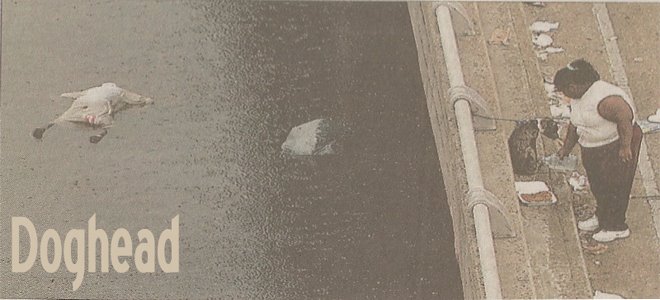
I understand when people say that the things in the films are strange or grotesque, but the world is strange and grotesque. They say that truth is stranger than fiction. All the strange things in the films are triggered by this world, so it can't be all that strange. The thing I love most is absurdity. I find real humour in struggling with ignorance. If you saw a man repeatedly running into a wall until he was a bloody pulp, after a while it would make you laugh because it becomes absurd. But I don't just find humour in unhappiness - I find it extremely heroic the way people forge on despite the despair they often feel.
David Lynch has always polarised audiences. Some find him a unique and hugely talented auteur of television and cinema, other see him as extreme, obtuse, unecessarily dense. I'm most certainly in the former camp, but I can understand the opinions of the latter. He constantly challenges audience expectations by making them work for greater answers and meaning within his work. Lynch on Lynch is by all accounts essential reading for any fans of his work, and even recommended for those yet to be won over. Lynch comes across at all times within the book as warm, open and with a homey, innocent sense of humour. The book covers everything up until Mulholland Drive, so anyone yearning for an explanation of Inland Empire will probably have to wait for the next edition. The book's set out in an interview format between editor Chris Rodley and Lynch, and some really interesting avenues are explored, from film trivia and interpretations, to reflections on transcendal meditation and music.
I originally read Lynch on Lynch while on tour in Finland, but left the book on the plane home like a tit, but went out and rebought it because I knew it would be a book I would return to time and time again. Only the other day I re-read The Elephant Man chapter after watching it on Christmas Day, and was rewarded with this exquisite interpretation of Joseph Merrick, the titular character of the film:
...you see pictures of explosions - big explosions - they always reminded me of these papillomatous growths on John Merrick's body. They were like slow explosions. And they started erupting from the bone. I'm not sure what started the explosion, but even the bones were exploding, getting the same texture, and it would come out through the skin and make these growths that were slow explosions. So the idea of these smokestacks and soot and industry next to this flesh was also a thing that got me. Human beings are like little factories. They turn out so many little products. The idea of something growing inside, and all these fluids, and timings and changes, and all these chemicals somehow capturing life, and coming out and splitting off and turning into another thing... it's unbelievable.
The book is literally bursting with such quotes that cannot help but enrich the viewing experience. I've never been a fan of director's commentaries because I feel it requires a lot of patience to sit through many films with people talking over the bits you actually want to see, so books like Lynch on Lynch really appeal to me. Some of my favourite films are by Lynch: Wild at Heart and Blue Velvet to name but two, and Twin Peaks is probably my all time favourite TV programme, so I get one hell of a kick out of flicking through this and picking up new gems every time. Who'd have thought, as a final example, that Lynch and his film crews would be 'freaking out', blasting Rammstein tapes all day on the set of Lost Highway?
To finish, a short quote that succincly lays out Lynch's attitudes to his films. I hope those of you who are still scratching your head at Lost Highway or Mullholland Drive can perhaps take some comfort from this.
Chris: The movie is full of obvious clues, but there are many other things that are important visual and audio indicators that are not obvious. So at times it does seem as if you're delighting in teasing or mystifying the viewer.
Lynch: No, you never do that to an audience. An idea comes and you make it the way the idea says it wants to be, and you just stay true to that. Clues are beautiful because I believe we're all detectives. We mull things over and we figure things out. We're always working this way. People's minds hold things and form conclusions with indications. It's like music. Music starts. A theme comes in, it goes away and when it comes back it's so much greater because of what's gone before.
But audiences have struggled with trying to work the movie out and, at a certain point, they just want you to tell them what it all means - to you.
Yeah, and I always say the same thing: I think they really know for themselves what it's about. I think that intuition - the detective in us - puts things together in a way that makes sense for us. They say intuition you an inner knowing, but the weird thing about inner knowing is that it's really hard to communicate that to someone else. As soon as you try, you realise that you don't have the words, or the ability to say that inner knowing to your friend. But you still know it! It's really frustrating. I think you
can't communicate it because the knowing is too beautifully abstract. And yet poets can catch an abstraction in words and give you a feeling that you can't get any other way.
I think people know what Mulholland Drive is to them but they don't trust it. They want to have someone else tell them. I love people analysing it but they don't need me to help them out. That's the beautiful thing, to figure things out as a detective. Telling them robs them of the joy of thinking it through and feeling it through and coming to a conclusion... The frames are always the same on the film - it's always the same length and the same soundtrack is always running along it. But the experience in the room changes depending on the audience. That's another reason why people shouldn't be told too much, because 'knowing' putrefies that experience.


















